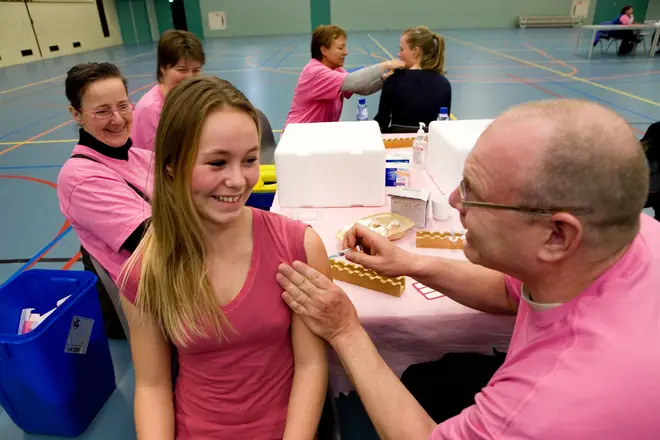
Ali Miraj 1pm - 4pm
4 November 2021, 08:42

The rate of cervical cancer has been cut by almost 90 per cent in women who have received the HPV vaccine, according to a major study.
In the first proof that the programme is working to save lives, a Cancer Research UK-funded study found that cervical cancer rates in women offered the vaccine between the ages of 12 and 13 - who will now be in their 20s - were 87 per cent lower than in an unvaccinated population.
It translates to a drop in cases in this age group from about 50 per year to just five.
Women who received the vaccine between the ages of 14 and 16, and 16 and 18, also saw a reduction in cancer rates, by 62 per cent and 34 per cent respectively.
Read more: Boris Johnson took private plane back to London from COP26 climate summit
Read more: Prince Andrew to face US trial from September 2022
"It's been incredible to see the impact of HPV vaccination and now we can prove it prevented hundreds of women from developing cancer in England," said Professor Peter Sasieni, lead study author, from King's College London.
"We've known for many years that HPV vaccination is very effective in preventing particular strains of the virus, but to see the real-life impact of the vaccine has been truly rewarding.
"Assuming most people continue to get the HPV vaccine and go for screening, cervical cancer will become a rare disease.
"This year we have already seen the power of vaccines in controlling the Covid-19 pandemic. These data show that vaccination works in preventing some cancers."

NHS backlog leading to cancer going untreated 'barbaric'
The study looked at data from the human papillomavirus (HPV) immunisation programme using the vaccine Cervarix, which was given to girls on the NHS from 2008 to September 2012.
A different vaccine, Gardasil, is now used for the programme, and is given to girls and boys aged 12 and 13 - and charity Jo's Cervical Cancer Trust said this vaccine "provides an even higher level of protection".
Chief Executive of the charity Samantha Dixon said the news was "incredibly positive", especially "at a time of when the topic of vaccination is in the public eye".
"We are truly on the path to making cervical cancer a thing of the past," she said, although she warned against 'complacency' and highlighted the importance of the cervical screening - previously called a cervical smear - programme.
"We must not get complacent however and must work to ensure every child has the opportunity to access their vaccination, especially as Covid continues to affect programme delivery," she said.
"No vaccine is 100 per cent effective and cervical screening remains an important test."

Cross-panel clash over mandated vaccines for health workers
The study by Cancer Research UK used data to estimate that, by June 2019, there were around 450 fewer cases of cervical cancer than expected in those vaccinated against HPV in England.
The study also found there were 17,200 fewer cases of cervical carcinomas - pre-cancers - than expected in the vaccinated group.
Pre-cancerous cell changes in women vaccinated between the ages of 12 and 13 were down by 97 per cent.
Those vaccinated in their later teenage years also have a reduced risk of developing pre-cancerous cells.
Experts believe that, without vaccination, the toll for pre-cancerous changes could have affected almost 36,000 women.
Read more: 'We've got her': Emotional audio of police rescue of Australian girl Cleo Smith released
Read more: Tory MP loses her job after abstaining on Owen Paterson vote
Researchers said the findings, published in The Lancet medical journal, provide the first direct worldwide evidence of prevention of cervical cancer using a vaccine for two types of HPV, which is the virus that causes it.
Cancer Research UK chief executive Michelle Mitchell said the results showed "the power of science".
"It's a historic moment to see the first study showing that the HPV vaccine has and will continue to protect thousands of women from developing cervical cancer," she added.

Cancer doctor urges people to see GPs after urgent checks missed
Dr Vanessa Saliba, consultant epidemiologist for UK Health Security Agency (UKHSA), which also took part in the study, said: "These remarkable findings confirm that the HPV vaccine saves lives by dramatically reducing cervical cancer rates among women.
"We encourage all who are eligible for the HPV vaccine to take it up when it is offered in school. All those eligible can catch up until their 25th birthday.
"Together with cervical screening, this will help to protect more women from preventable cases of cervical cancer."
At the moment in the UK, around 3,200 cases of cervical cancer are diagnosed each year.
The study looked in detail at cancer registry data between January 2006 and June 2019 for seven groups of women who were between the ages of 20 and 64 at the end of 2019.
The National Cancer Registration and Analysis Service (NCRAS) run by NHS Digital also took part in the study.